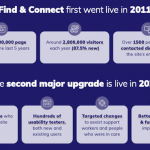People who grew up in out-of-home care know much less about their childhood than most in our community, and are actively prevented from finding out banal details that are often taken for granted – the names of their classmates, school photographs, photographs of their friends and carers. This community has as much right to information about those that were in their lives as children – their friends, carers and families -as every other Australian.
A significant barrier to accessing that information is the reliance on Freedom of Information (FOI) requests to access child welfare records held by state governments. This is a nationwide problem that we recently brought to the attention of the Victorian government’s Inquiry into the operation of the Freedom of Information Act in a submission, and then on Wednesday 13th March, by giving evidence to the public hearings. We were invited to the hearing on the strength of our submission to the inquiry which detailed the issues and barriers that people who were in care encounter when they are forced to use the FOI system to access records from their time in care.
The major concerns we found with the use of FOI are that:
1. The current FOI policy model is not effective or fit for purpose for the release of, and access to child welfare records, and other mechanisms for release are better suited for these records.
2. In the case of child welfare records, the mechanisms and processes set out in the Access to Records by Forgotten Australians and Former Child Migrants: Access Principles for Records Holders, Best Practice Guidelines in providing access to records document (Principles and Guidelines) provide underlying principles, decision making guidance and a process for every step of a records access request to follow.
3. The importance of these records to Care Leavers should be recognised through the implementation of more effective and appropriate informal or administrative records access processes, rather than FOI. The right of reply to child welfare records should be publicised, and enacted with a flexible approach about what is right for individuals accessing and responding to their records.
4. The current time and costs involved in processing child welfare records for release under FOI are extensive. This is because of the considerable manual processing that must be done to redact exempted information before records can be released. This means that important information required by Care Leavers may be removed, leading to backlogs which create additional distress for Care Leavers, on top of receiving redacted files.
Freedom of Information requests should only be a last resort, and the government should use access principles in the Principles and Guidelines for administrative release of records. The importance of these records must be recognised in developing a better system of access, that supports the right of reply for the person the records were created about. This system should allow people who were in care to access their records in a trauma-informed, timely way.






